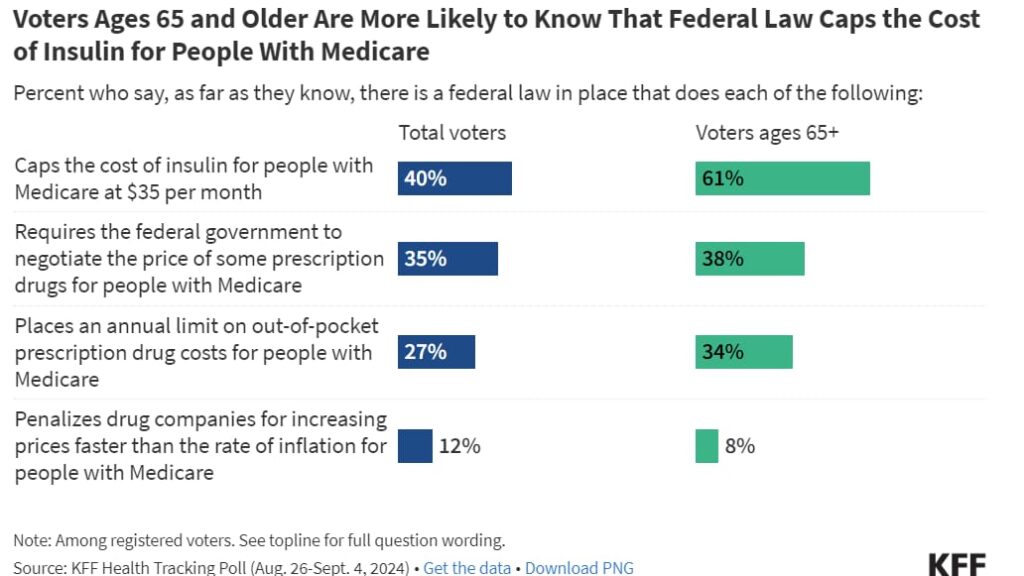We’re into the heavy part of the drug-wonk season, so today’s newsletter packs in — frankly — a bit more than I would ordinarily like to throw at you (especially on a day when I’m on the road).
But the KFF polling that I discuss is quite amazing, and the news flow this morning ended up being more dramatic than I would have guessed. Boom times, I suppose. Pitter patter …
I have no idea quite what to make of Cigna/Evernorth/Express Script’s announcement that they’re suing the FTC to get the agency to retract its interim report from July trying to kneecap the PBM industry. (The company gave WSJ the scoop.)
The legal niceties are well beyond me — I’ll report back when more experienced voices have spoken — but, at a minimum, this is a PBM pulling the whole the-best-defense-is-a-good-offense strategy.
And maybe that’s the right move commercially. Maybe health plans will feel slightly less worried about the FTC knowing that their vendor is willing to sue over the report. And maybe it’ll intimidate the FTC into not taking additional action. I really don’t know.
But I’m not sure this is a winning strategy from an external relations POV. Attacking the messenger feels like a pretty extreme reaction to an already-beleaguered industry, and it’s likely to attract scorn from those who feel personally victimized by the PBMs.
And there might be a Streisand Effect element, too, where Evernorth’s pushback engenders another look at an FTC report that, whatever its flaws, is fairly damning in its presentation.
The results from this KFF poll about people’s knowledge of the IRA are pretty wild.
I mean, I know that I’m an outlier. I wrote, like, a thousand words over the past week navel-gazing about what abbreviation we should use for the Medicare Prescription Plan. But even correcting for the fact that I’m in deep (and everyone around me is in deep), I was struck by the invisibility of the biggest and most-hyped health care reform law in a decade.
Here are the high-level findings:**
35% of Americans (38% of those 65+) have heard of the “negotiation” provisions of the IRA.
Only 27% have heard of the OOP cap (34% of those 65+, even though a phased-in version of the cap is in place right now).
Awareness of the $35 insulin policy does a little better (40% overall/61% for 65+), but — wow — those are not big numbers.
As a reminder, Medicare negotiation has been a campaign promise of every Democrat going back 20 years. The KFF poll shows support for the idea is at 85%. More Americans think a UFO crashed in New Mexico in the 1940s than think negotiation is a bad idea.
And yet … no one is tracking on the actual policy actually enacted?
The poll has lots of other mind-boggling stats that affirm that Americans just aren’t paying attention. For example, 46% of those polled said that congressional Republicans played a major or minor role in the passage of the law (it passed on a party-line vote).
But the ignorance is only one piece of what’s going on here. This is the third time KFF has measured awareness of IRA provisions. The last time was in May. And there has been zero increase in awareness between May and the latest poll, which was fielded this month.
That shouldn’t be the case. News about price control was all everywhere.
The New York Times and Wall Street Journal put it on their front pages. The Boston Globe ran it inside, but devoted 80% of the business front, including a big photo illustration, a chart, and two different stories. Good Morning America covered. TODAY covered. Xavier Becerra did Morning Joe. It was on CNN. And CNBC. You get the gist.
Before that deluge of coverage, 36% of Americans were aware of Medicare negotiation. After that deluge … 35% of Americans were aware. (Via the poll’s topline.)
That says something profound, I think, about the way that the news has fragmented. Media critics often talk about the fragmentation of media sources — people living in a Fox News bubble or an MSNBC bubble or WaPo or Politico or whatever — but it feels like people are also living in topical bubbles.
We seek out certain topics of interest to us and block out the rest. Some of this is a function of our digital tools showing us only the red-meat topics that drive engagement. Some of this is a function of our brains avoiding the boring stuff.
So this feels like evidence that the vast majority of Americans — even those with a lot of skin in the game — are filtering out health policy news. It goes without saying that that is a problem. It suggests that consumers are not tuned in enough, which makes them unlikely to drive policy change. And that, in turn, risks further ossifying our broken system.
And it provides, in some ways, an explanation for the observation in the New York Times last week that health policy is, for the first time in more than 30 years, not a meaningful issue in a presidential election.
People are just really tuned out, and I don’t think we’ve remotely begun to come to terms with that.
** There was also a question about support for Kamala Harris’ plan to take the $2,000 cap into the commercial market. I’m not going to talk about that here because I think it’s pretty plain that no one understands what that would mean. (i.e. higher premiums for all)
On a regular day, I’d give this more attention, but you should totally download this Avalere study — backed by the Community Oncology Alliance — that estimated that physicians will take a $25 billion hit when price controls hit Part B drugs. There is a whole separate discussion about whether a portion of physician finances should be linked to drug prices, but it’s hard to avoid that there is going to be some real pain come 2028.
This Axios story is kind of funny. It says that Republicans are beginning to get loud about getting rid of Medicare price controls but kind of pivots to the reality that no one is really going to make a real effort to make that happen. I assume that there will be continued harping about the “bailout” of the Part D plans but taking a firm stand against a policy that most people generally like and/or haven’t heard of doesn’t seem like a winner. Maybe this stuff came up today at the Senate Finance hearing on the topic, but I haven’t dug in yet.
Speaking of hearings, Bernie Sanders is going to talk insulin and obesity meds with a friendly crowd of pharma skeptics tomorrow. I expect it’ll be more divorced-from-reality spin. React accordingly.
Thanks for reading this far. I’m always flattered when folks share all or part of Cost Curve. All I ask is for a mention or tag. Bonus points if you can direct someone to the subscription page.





